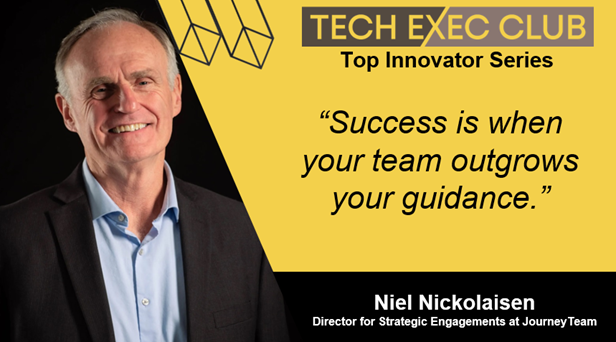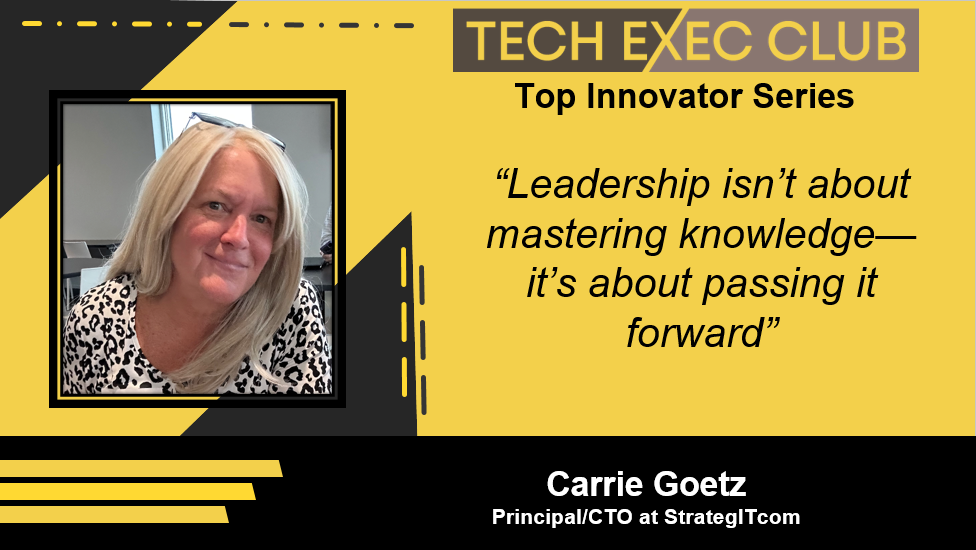In today’s hyper-competitive, fast-evolving world of technology leadership, success is often mistakenly measured by how much control a leader can exert or how deep their technical expertise runs. But Niel Nickolaisen’s remarkable career tells a very different story—one that began with micromanagement and ended in mentorship, empowerment, and legacy-building.
As the Director of Strategic Engagement at JourneyTeam, Chairman of the CIO Council at FC Centripetal, and adjunct research faculty at IDC, Niel has worn many hats and navigated countless complex transformations. Yet, what distinguishes him isn’t just his titles or achievements—his willingness to confront his failures and fundamentally change how he leads. In a candid and insightful interview with Josef Martens on the Top Innovator Series, Niel reveals how a painful leadership misstep early in his career became the catalyst for a profound personal evolution.
Once convinced that leadership meant making every decision and solving every problem, Niel was at a crossroads when his most trusted team members rejected his authoritarian style—despite delivering a successful project. That painful experience forced him to reassess not only his methods but his entire understanding of what leadership should be.
Through years of reflection, experimentation, and growth, Niel developed a leadership philosophy rooted in trust, accountability, and empowerment. Today, he dedicates his work to mentoring future leaders, guiding startups, and helping organizations navigate the disruptive forces of technological change—all while advocating for a human-centered approach to leadership.
This article explores Niel’s journey from control to collaboration, micromanagement to mentorship, and from being the “world’s greatest problem-solver” to someone who now teaches others to solve their challenges. His story is a blueprint for effective leadership and a powerful reminder that the best leaders create environments where others can thrive, innovate, and grow.
The Evolution of Leadership: From Control to Empowerment
Early in his career, Niel Nickolaisen made a common mistake shared by many highly skilled professionals transitioning into leadership roles. He believed leadership was a natural extension of technical mastery. In his mind, being the most knowledgeable, the most capable problem-solver, and the sharpest decision-maker made him the obvious person to lead others. His leadership style mirrored that belief. He kept control of projects, gave orders, and expected success from centralizing decisions around his expertise.
He even likened his role to a concertmeister in a symphony orchestra—the first violinist who leads by personal excellence. “I thought if I played the violin the best, the rest would follow,” Niel recalls. It seemed logical. And for a while, it worked. Projects were delivered. Outcomes were achieved. But beneath the surface, something was cracking.
Over time, through reflection and real-world feedback, Niel realized his analogy was flawed. Great orchestras don’t succeed because the concertmeister dominates. They succeed because a conductor creates the space where every musician can contribute their best. Leadership wasn’t about being the best violinist. It was about putting down the violin entirely.
“I had to leave my instrument behind and focus on creating the right container—the right culture—for others to thrive,” Niel says. This profound realization didn’t just change how he led. It changed how he thought about success itself. No longer measured by how much he could control, success became about how much he could empower.
The Turning Point: A Painful but Necessary Failure
Leadership transformations rarely come from comfort. For Niel, the change was sparked by a painful—and humbling—experience.
Years ago, he was entrusted with leading a high-profile ERP (Enterprise Resource Planning) implementation. The stakes were enormous: $27 million in budget, a 110-person team, and a tight 14-month timeline. Determined not to fail, Niel handpicked a trusted inner circle of 10 colleagues. These were his best people—the ones he knew could deliver. And deliver they did. The project met every objective: on time, budget, and scope.
By all external metrics, it was a triumph. But internally? It was a disaster.
“After the project ended, each of my trusted team members came to me, individually, and said they never wanted to work with me again,” Niel recalls. His first reaction was disbelief. “You should be naming your children after me for what I did!” he joked. But the humor masked a deep hurt and an even more profound lesson.
The problem wasn’t the results but how those results were achieved. Niel had micromanaged every aspect. His control, rather than empowering his team, had suffocated them. The very strengths that had made him successful—decision-making, problem-solving, and technical mastery—had become liabilities. “The thing I was best at,” he realized, “was the thing that was hurting me.”
That moment marked the beginning of his transformation. Instead of doubling down on control, Niel chose to change.
Building a Culture of Trust and Accountability
After his painful wake-up call, Niel made a decision few leaders dare to make: he dismantled the behaviors that had once brought him success. He began the long, sometimes challenging, journey from micromanager to mentor.
First, he created a personal accountability system he humorously dubbed “Micromanagers Anonymous.” If he ever felt the old urge to control resurface, he would reach out to trusted peers and confess. But beyond humor, he adopted practical, meaningful changes in how he led his teams.
He stopped making decisions for others and began coaching them to become independent decision-makers. He encouraged his team members to take ownership of challenges and learn the art of problem-solving. “My job became helping everyone else become an amazing decision-maker and problem solver,” he explained.
One of his most important changes was his approach to mistakes. Instead of blaming individuals when things went wrong, Niel taught his teams to examine and improve the processes. “If something went wrong, it wasn’t because someone failed. The process failed them.”
He also shifted focus away from measuring individuals and instead measured outcomes. This shift created a culture of trust and accountability, where team members felt empowered and responsible for results. Over time, Niel witnessed his teams not only achieving success but doing so with resilience, collaboration, and innovation. The burdens of leadership became shared, and the outcomes multiplied.
“The results were amazing,” he says. “Not only did the teams achieve more, but I could finally enjoy leadership without feeling like the organization’s weight was solely on my back.”
Mentorship and Multiplying Leadership Impact
Having navigated his transformation, Niel felt a growing responsibility to help others avoid the same pitfalls. He recognized a profound truth: leadership grows exponentially when leaders create more leaders—not followers.
Today, Niel’s primary role is mentorship. At JourneyTeam, he helps organizations navigate complex change. At FC Centripetal, he advises startups on leadership and technology strategy. As chairman of the CIO Council and adjunct faculty at IDC, he educates and develops future technology leaders.
“I tell people everything I’ve learned came because I was a total train wreck—and I had to recover from that train wreck,” he says, laughing. But behind the humor lies a serious mission: to cultivate the next generation of leaders who lead with trust, empower their teams, and understand that authentic leadership is about creating the right environment for success, not controlling outcomes.
His mentoring work has already paid dividends. The leaders he’s coached now lead their successful teams, spreading the same principles of trust, accountability, and empowerment. “It’s not about being irreplaceable anymore,” Niel explains. “It’s about ensuring others are ready to take the baton and run.”
Preparing for the Future: Leadership Amid Rapid Technological Change
As technology accelerates at breakneck speed, leadership faces new and unprecedented challenges. Niel believes the next generation of leaders must be equipped to manage technology and guide people through the human side of Disruption.
“We’re facing change at a scale we’ve never dealt with before,” he warns. The rise of AI, generative AI, and other transformative technologies is reshaping industries—and doing so rapidly. Leaders can no longer afford to focus solely on operational tasks or technology implementations. They must become influential leaders who anticipate change, communicate its impact, and support teams through inevitable uncertainty.
“The future belongs to curious and proactive leaders,” Niel explains. “They can’t wait to be told what’s coming. They have to push boundaries and prepare their organizations for what’s next.”
Niel’s journey has equipped him well for this role. He’s already helping organizations navigate the AI revolution, balancing technical possibilities with the need for empathetic change management. He focuses on building resilient, adaptive cultures where teams can survive Disruption and thrive within it.
As he reflects on his career and the road ahead, Niel is clear about his purpose: to help leaders embrace empowerment over control, curiosity over complacency, and trust over micromanagement. “It’s a freeing experience,” he says. “And it’s the only way to lead in the future.”
For leaders at any stage—whether emerging, mid-career, or seasoned—Niel Nickolaisen’s journey offers a roadmap for transforming how they lead and build empowered, resilient teams and organizations.
Here’s how to apply his hard-earned wisdom:
1. Redefine Your Leadership Philosophy: Stop equating leadership with expertise. Technical skills get you noticed. Leadership demands creating the space for others to thrive. Shift from doing to enabling. Your success as a leader is measured by how well others perform without direct intervention.
2. Learn from Failures—And Let Them Shape You: Embrace painful lessons. Don’t hide from failure. Reflect deeply, as Niel did, and let these experiences drive growth. Cultivate self-awareness. When your team gives feedback—even uncomfortable feedback—listen and act.
3. Empower Decision-Makers, Not Dependents: Stop solving every problem. Coach your team to become decision-makers and problem-solvers themselves. Create ownership. Transfer authority and responsibility to the team. Trust them to handle challenges.
4. Build a Culture of Trust and Accountability: Trust first. Empowering others starts with trusting their capabilities and judgment. Fix processes, not people. When failures occur, analyze the system, not the individuals.
5. Become a Mentor and Multiplier: Share your experiences. Help others avoid the mistakes you once made. Invest in leadership development. Focus on growing more leaders, not followers. Celebrate when your team outgrows your guidance. That’s a sign of true leadership success.
6. Stay Curious and Lead Through Change: Anticipate Disruption. Like Niel, be proactive in understanding how technologies—especially AI—will reshape your industry. Prioritize change management. Support your team through change with empathy, clarity, and resilience.
7. Hold Yourself Accountable: Create systems to catch old habits. Whether it’s a “Micromanagers Anonymous” group or trusted peers, ensure someone calls you out when you slip back into controlling tendencies. Practice continual reflection. Regularly ask yourself: Am I empowering or controlling?
Niel Nickolaisen’s leadership story is not just an inspiring tale of personal growth—it’s a testament to the power of humility, resilience, and the courage to change. His willingness to confront hard truths, abandon long-held beliefs, and embrace a leadership style centered on trust and empowerment has transformed his career and elevated countless others.
From a self-proclaimed micromanager determined to control every outcome, Niel has become a mentor, a guide, and a multiplier of leadership. His journey is a valuable reminder that effective leadership is not about being indispensable but about creating an environment where others can succeed without you. Today, whether advising startups, mentoring future CIOs, or helping organizations navigate the disruptive waves of technology and change, Niel remains committed to one clear purpose: empowering the next generation of leaders to thrive. His story challenges us all to reflect on how we lead, how we grow, and how we can leave a legacy not of control—but of trust, accountability, and shared success.
Want to hear Niel Nickolaisen’s insights firsthand? Watch the full, live podcast interview [click here]





